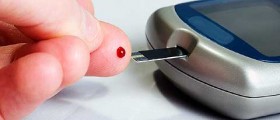
Causes of Polyuria
Endocrine Medical ConditionsPolyuria is together with polydipsia the leading symptoms of diabetes mellitus. Polyuria also affects people who are suffering from cranial diabetes insipidus. It can be also one of the features of Cushing's syndrome.Kidney DisordersPolyuria is a characteristic of one stage of the chronic renal failure. After polyuria the patient develops oliguria and finally anuria which means that the production and elimination of the urine eventually ceases. Polyuria can also affect patients who have been suffering from urinal obstruction caused by kidney stones and stones in ureter after they have finally been removed. This symptom is also evident in early chronic pyelonephritis and in Fanconi syndrome.Iatrogenic CausesProlonged and excessive usage of diuretics causes polyuria. Polyuria is also induced by alcohol consumption. Even some medications such as lithium or tetracyclines may cause this symptom.Metabolic DisordersIncreased level of calcium in blood which most commonly occurs in hyperparathyroidism or lytic bone metastases may be a cause of polyuria. It also occurs in hypokaliemia. Hypokaliemia develops as a part of different medical conditions such as chronic diarrhea, primary hyperaldosteronism and so on.Psychological CausesIncreased urine output is evident in compulsive drinking of water which is a characteristic of psychogenic polydipsia. This symptom may point to a severe psychotic disease and if not treated properly it can result in increased level of natrium and perhaps coma or death.Other CausesPolyuria may be additionally a symptom of sickle-cell anemia or paroxysmal supraventricular tachycardia.Visible Signs of Polyuria
The patient is dehydrated. The skin and visible mucous membranes are dry, the tongue is also dry and coated with whitish deposits or there are cracks on the tongue. The blood pressure is low and pulse rapid.
Tests
The doctor takes the urine samples and look for the presence of sugar or proteins in urine. This may help in setting of the diagnosis. Osmolality of urine is also improtant as it drastically changes in polyuria. Urine electrophoresis may show the presence of Bence Jones protein which points to myeloma. Myeloma leads to hypercalcemia which is only one cause of polyuria.
Apart from urine the doctor will examine blood as well. And additional tests and examinations will be performed, so that the real cause can be established and proper treatment chosen.

















Your thoughts on this
Loading...